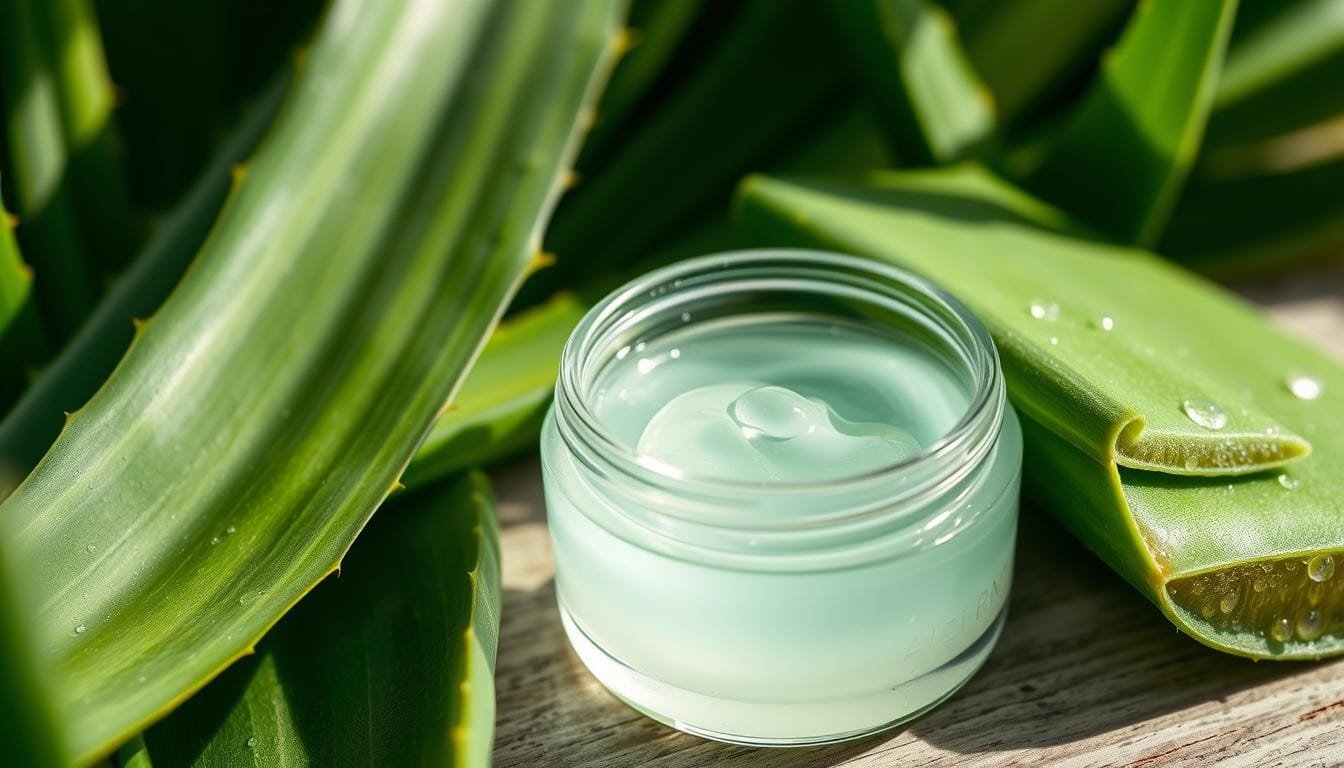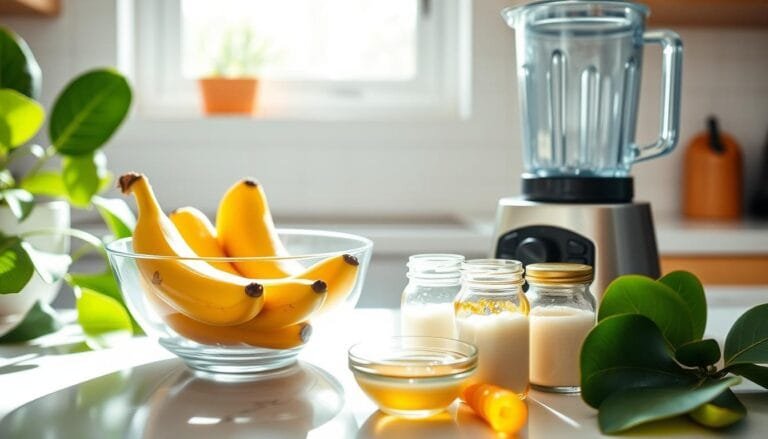Struggling with skin irritations can be tough. Finding a natural remedy is key. Aloe vera has been a game-changer for me.
Aloe vera has been a natural fix for skin issues for over 6,000 years. Its clear gel is known for soothing, hydrating, and healing. It’s great for skin inflammation, rashes, and more.
So, why does aloe vera work so well? It’s packed with beneficial compounds. Aloe vera gel has over 75 active ingredients. These help reduce inflammation, fight bacteria, and hydrate the skin.
Dealing with rashes, sunburns, or chronic conditions like eczema or psoriasis? Aloe vera might be your answer. Just remember to use it wisely and talk to a doctor if needed. Aloe vera can offer relief for many skin irritations.
Understanding Aloe Vera’s Historical Use in Skincare
The aloe vera plant has been a key part of traditional medicine and skincare for centuries. It has a long history, dating back to ancient times. This plant is known for its healing powers and has been important in many cultures worldwide.
Ancient Origins and Traditional Applications
Aloe vera has been used as a natural remedy for thousands of years. The ancient Egyptians called it the “plant of immortality.” They used it for its healing and skin-soothing effects. In India, the ancient Ayurvedic tradition has always included aloe vera in its wellness practices.
Today, aloe vera is used in both skincare and medicine. Its effectiveness has made it a common ingredient in many products. This includes creams, lotions, supplements, and even some medicines.
Evolution of Aloe Vera in Modern Medicine
Our understanding of aloe vera has grown, leading to its wider use in medicine. It is now known for helping with burns, rashes, and other skin issues. Studies have shown its anti-inflammatory, antimicrobial, and moisturizing effects. This has made it a part of modern healthcare.
“Aloe vera has been known and used for centuries for its health, beauty, medicinal, and skin care properties.”
The Science Behind Aloe Vera’s Healing Properties
Research has shown that aloe vera is great for the skin. It has compounds that fight inflammation, kill bacteria, and moisturize. These properties help soothe, heal, and hydrate the skin.
A study in the Annals of Dermatology found that aloe vera can also improve skin elasticity. It does this by providing antioxidants, vitamins, and other nutrients. These help nourish the skin from the inside.
| Scientific Findings | Reported Benefits |
|---|---|
| Anti-diabetic effects of Aloe arborescens Miller components | Hypoglycemic action and systemic absorption |
| Aloe vera L. juice combined with glibenclamide for diabetes | Antidiabetic activity |
| Aloe vera vs. silver sulfadiazine for second-degree burns | Favorable results for aloe vera |
| Efficacy of aloe vera for burn wound healing | Positive outcomes |
| Anti-inflammatory potentia of Aloe vera gel | Effective in the ultraviolet erythema test |
| Aloe vera gel for psoriasis vulgaris treatment | Positive outcomes in a double-blind, placebo-controlled study |
These studies prove aloe vera’s healing powers. They show its value in skin care and other uses. This confirms its traditional use and opens new doors for its use.
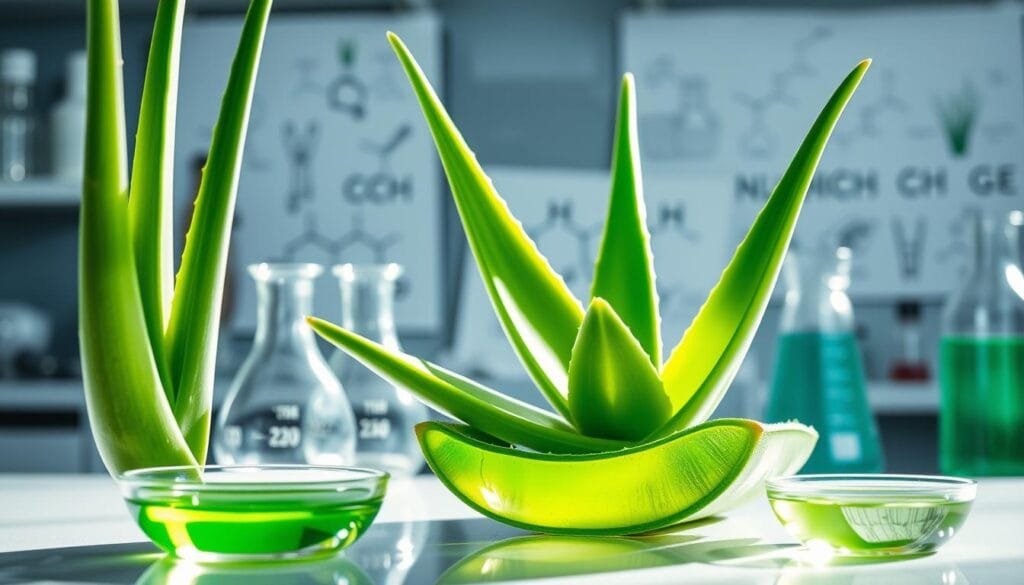
“Aloe vera has an estimated annual market value of $13 billion globally, making it a significant player in the cosmetic, pharmaceutical, and food industries.”
More research is showing aloe vera’s ability to soothe, hydrate, and rejuvenate the skin. Its natural origin and proven benefits make it a valuable ingredient for healthy, radiant skin.
Benefits of Aloe Vera for Skin Irritation: Key Components
Aloe vera is great for skin irritation thanks to its active parts. It has anti-inflammatory, antimicrobial, and moisturizing properties. This makes it a natural fix for many skin problems.
Anti-inflammatory Properties
Aloe vera’s polysaccharides and anthraquinones are anti-inflammatory. They reduce redness, swelling, and discomfort from skin irritation. These compounds help soothe minor burns, sunburns, and eczema.
Antimicrobial Effects
Aloe vera fights off harmful bacteria, fungi, and viruses. This is due to saponins and anthraquinones. It’s a natural way to treat minor wounds, cuts, and infections.
Moisturizing Elements
Aloe vera deeply hydrates and soothes the skin. Its mucopolysaccharides, like acemannan, keep moisture in. This helps with dryness, flakiness, and discomfort from skin conditions.
Aloe vera is a popular natural remedy for skin issues. Its gentle nature makes it safe and effective for natural skincare.
How Aloe Vera Treats Different Types of Rashes
Aloe vera is a natural wonder for skin health. It can change the game in treating different rashes. Whether it’s an allergic reaction, heat rash, or diaper rash, aloe vera’s soothing and anti-inflammatory properties offer much-needed relief.
A 2012 study on infants with diaper rash found that aloe vera gel was effective. This is because aloe vera has anti-inflammatory and antimicrobial effects. These help soothe irritation and prevent further skin irritation.
But, aloe vera’s effectiveness can vary. It works well for rashes caused by allergies or heat. Yet, it might not be as effective for rashes from complex skin conditions like eczema or psoriasis.
Aloe Vera’s Versatility in Rash Relief
Aloe vera’s unique composition makes it a versatile natural remedy for various types of rashes:
- Its high water content provides a cooling and hydrating effect. This helps alleviate itching and inflammation from rashes.
- Its antimicrobial properties can prevent skin infections, common with certain rashes.
- Aloe vera’s anti-inflammatory abilities reduce redness, swelling, and discomfort.
Whether facing an unexpected allergic reaction or a persistent diaper rash, using aloe vera can be a natural and effective way to find relief.
“Aloe vera has been clinically shown to promote and accelerate the wound-healing process, acting as an ideal wound dressing, based on a 2019 study.”
| Rash Type | Aloe Vera’s Benefits |
|---|---|
| Allergic Rash | Anti-inflammatory and cooling properties |
| Heat Rash | Hydrating and soothing effects |
| Diaper Rash | Anti-bacterial and wound-healing abilities |
Aloe Vera’s Role in Managing Eczema and Psoriasis
Aloe vera has been used for centuries to soothe irritated skin. It’s a popular natural remedy for eczema and psoriasis. While there’s limited scientific evidence, research suggests it may help manage these chronic skin conditions.
Treatment Methods for Eczema
Studies on aloe vera for eczema are few, but they show promise. It may aid in wound healing, reduce inflammation, and improve skin moisture. Its anti-inflammatory properties can help with the itchy, irritated skin of eczema.
People with eczema can try using aloe vera gel in their skincare routine. It’s safe for topical use and easy to find in drug stores and online.
Managing Psoriasis Symptoms
Aloe vera gel may also help with psoriasis symptoms. A 2018 study found that a mix of propolis and aloe vera improved symptoms in mild to moderate psoriasis over 12 weeks. While aloe vera alone might not control psoriasis, it can be used alongside other treatments.
It’s key to remember that aloe vera is generally safe but can cause mild side effects like burning or itching. Always do a patch test before using it widely. If you notice signs of infection, like pus or increased inflammation, see a healthcare professional.
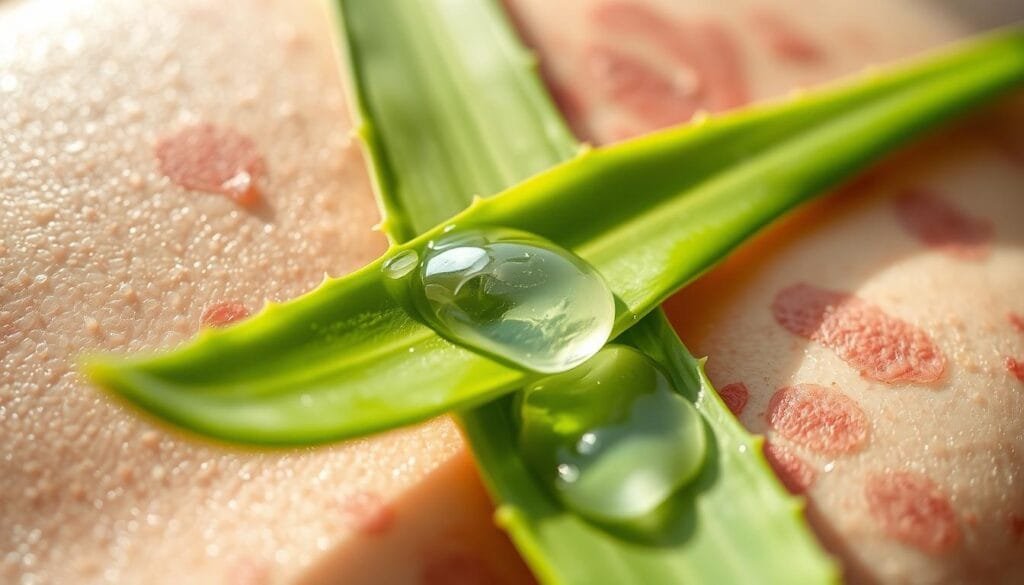
While the scientific evidence is limited, aloe vera’s benefits and safety make it a good natural option for eczema and psoriasis relief. But, it’s vital to talk to a dermatologist to create a full treatment plan. This ensures the best management of these chronic skin conditions.
Sunburn Relief and Heat Rash Treatment
Aloe vera is a hero for soothing sunburns and heat rashes. Its cooling and anti-inflammatory properties make it a natural solution for these skin irritations.
For sunburns, apply aloe vera gel to the affected areas. This can offer quick relief and help with healing. Applying it several times a day can reduce discomfort and inflammation.
Heat rashes, or miliaria, can be irritating. The good news is that aloe vera’s cooling effect can ease discomfort and inflammation. It can help with relief from hot, humid environments, intense physical activity, or other factors.
“Aloe vera has short-term anti-inflammatory and soothing properties and can provide relief from pain and swelling due to sunburn.”
Remember, prevention is key for sunburns. Use a broad-spectrum sunscreen with an SPF of 30 or higher. Wear protective clothing and seek shade to avoid sunburn.
Aloe vera’s versatility makes it a top choice for sunburn relief and heat rash treatment. Its soothing and anti-inflammatory properties offer natural, effective relief for these common skin irritations.
Natural Solution for Rosacea and Skin Redness
If you’re dealing with rosacea’s redness and irritation, aloe vera might help. It’s known for soothing and reducing inflammation. This makes it a good choice for managing rosacea symptoms.
Application Methods
To use aloe vera for rosacea, apply the fresh gel to affected areas during flare-ups. Its cooling and hydrating effects can quickly ease the burning and stinging. Massage the gel into your skin for even coverage.
Expected Results Timeline
Aloe vera won’t cure rosacea, but it can help. Some people see improvements in a few weeks. But, results can vary, and it might take time to find the right amount and frequency for you.
Other natural ingredients like green tea, oatmeal, chamomile, and raw honey also help with rosacea. Using a mix of these, along with lifestyle changes and medical advice, can help manage rosacea naturally.
“Aloe vera’s soothing and anti-inflammatory properties make it a natural solution for rosacea’s redness and irritation.”
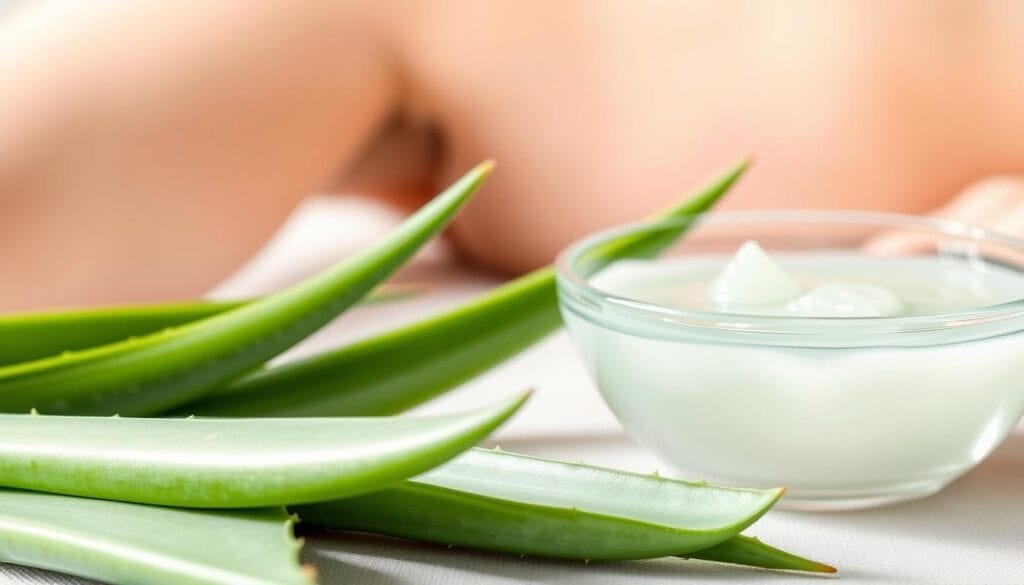
While natural remedies are helpful, always talk to a dermatologist or healthcare professional. They can help create a treatment plan that suits your needs and skin type. With the right approach, you can find relief from rosacea and improve your skin health.
Choosing the Right Aloe Vera Products
When picking aloe vera products, choose pure, 100% aloe vera gel. This way, you get all the benefits without any bad stuff. Avoid products with extra fragrances, colors, or preservatives. They can actually harm your skin.
For the best aloe vera, use fresh gel straight from the plant. It has the most vitamins, minerals, and antioxidants. This gives you the strongest benefits.
If you like something easier, look for aloe vera gel with other good stuff. These can help with skin problems like eczema or sun damage. Always check the ingredients and do a patch test first. This makes sure it’s good for your skin.
- Opt for pure, 100% aloe vera gel to avoid irritants
- Steer clear of added fragrances, colors, or preservatives
- Consider using fresh aloe vera gel for maximum benefits
- Look for products that combine aloe vera with other beneficial ingredients
- Always check the ingredient list and perform a patch test
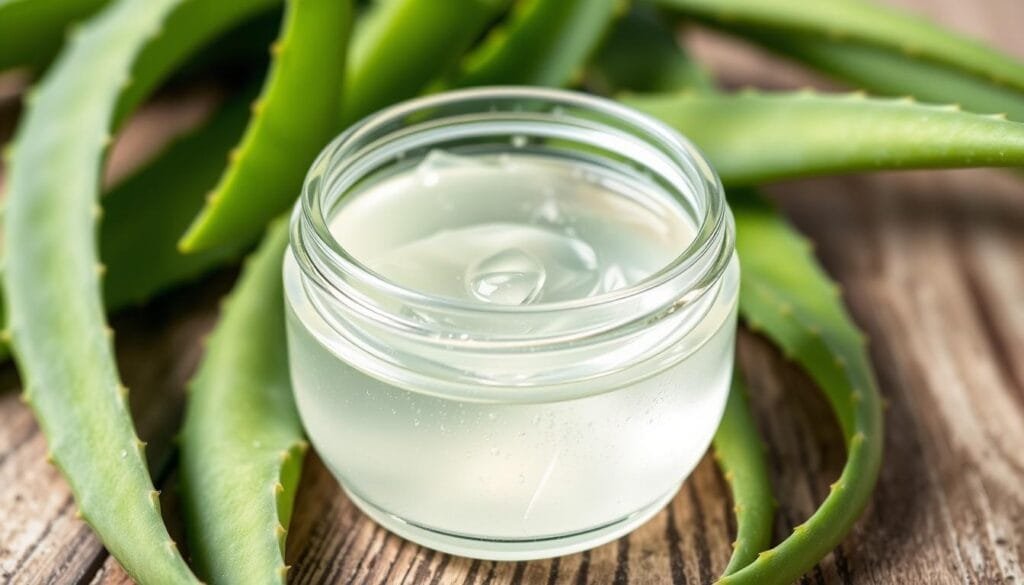
Choosing the right aloe vera products lets you use its natural power. It can soothe, hydrate, and nourish your skin. A little research can help you find the best aloe vera for your skin.
Safe Application Methods and Usage Guidelines
Using aloe vera for skin irritation needs the right application and how often to use it. Follow these easy steps to get the most out of this natural skincare:
Proper Application Techniques
Apply a lot of aloe vera gel to the affected area. Massage it into your skin until it’s all absorbed. Let it dry before you cover it with clothes or other products. Fresh aloe vera from the plant works best because it has more good stuff.
Frequency of Use
Apply aloe vera 2-3 times a day or when you need it. For sunburns, use it whenever your skin feels hot. Using it often helps aloe vera work its magic.
Always clean your skin before using aloe vera. Then, use a moisturizer if you need to keep your skin moist. By following these tips, you can make the most of aloe vera in your skincare routine. Enjoy its natural how to use aloe vera and aloe vera application benefits.
“Aloe vera has been used for centuries as a natural remedy for a variety of skin conditions, and with good reason. Its unique blend of antioxidants, anti-inflammatory compounds, and moisturizing properties make it a versatile and effective addition to any how to use aloe vera skincare routine.”
Potential Side Effects and Precautions
Aloe vera is often seen as a safe, natural remedy for skin issues. Yet, it’s key to know about possible side effects and take steps to avoid them. Some people might have allergic reactions to aloe vera. Signs of an allergy include redness, itching, and a rash on the skin.
Before using aloe vera on a big area, do a patch test first. Put a small amount on a hidden part of your skin. Wait 24-48 hours to see if there’s any bad reaction. If you feel any irritation or discomfort, stop using it right away and talk to a doctor.
Also, don’t use aloe vera on open wounds, severe burns, or badly damaged skin. Its cooling and soothing effects can help, but you should see a doctor for serious issues to avoid more problems.
If you notice any unexpected or ongoing side effects, like skin irritation getting worse, stop using it. Talk to a dermatologist or your doctor. They can help figure out the best way to use aloe vera and suggest other treatments if needed.
“Aloe vera is generally considered safe for topical use, but it’s always important to be cautious and monitor your skin’s reaction, even if you have a history of allergies or sensitive skin.”
Being careful about side effects and following safety tips can help you enjoy aloe vera’s benefits for your skin. Remember, everyone reacts differently. So, if you’re worried, it’s best to talk to a healthcare professional.
Combining Aloe Vera with Other Skincare Treatments
Aloe vera is a natural ingredient that can be easily added to your skincare routine. It works well with other treatments to enhance your aloe vera skincare routine. This way, your skin gets a full treatment for different concerns.
Aloe vera pairs well with natural ingredients like moisturizers, vitamins C and E, and treatments like tea tree oil or coconut oil. Apply aloe vera first and let it soak in. Then, add other products for a natural skincare combinations that meet your skin’s needs.
If you have acne, aloe vera is a great addition. It reduces inflammation and fights bacteria. Using aloe vera with other acne treatments makes your skin care gentler and more effective.
The options for complementary treatments are endless. Aloe vera fits into many skincare routines. It’s great for hydrating, soothing sensitive skin, or tackling sun damage or pigmentation. This way, you can make a aloe vera skincare routine that’s perfect for you.
| Ingredient | Benefits |
|---|---|
| Moisturizers | Aloe vera makes moisturizers more hydrating and nourishing, giving better skin hydration. |
| Vitamins C and E | These antioxidants boost aloe vera’s healing and anti-inflammatory effects, leading to healthier, brighter skin. |
| Tea Tree Oil | Tea tree oil’s anti-acne and antimicrobial properties are enhanced by aloe vera’s soothing effects. |
| Coconut Oil | Coconut oil’s moisturizing and nourishing qualities complement aloe vera’s hydrating and healing abilities. |
Adding aloe vera to your complementary treatments and natural skincare combinations unlocks your aloe vera skincare routine‘s full power. You’ll get healthier, more radiant skin.
When to Seek Professional Medical Advice
Aloe vera can help with many skin issues. But, knowing when to see a doctor is key. If your skin problem lasts more than a few days or gets worse, get help. Also, seek medical help right away for sudden rashes that cover your whole body or come with fever or pus.
A dermatologist can give you a proper diagnosis and suggest the right treatment. They can figure out if aloe vera or other treatments are best for you. Sometimes, you might need a mix of treatments or prescription drugs to fix your skin.
It’s safer to get medical advice if home remedies or over-the-counter products don’t work. A dermatologist can offer personalized advice and help you get the results you want.
